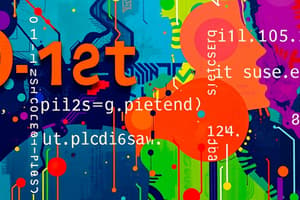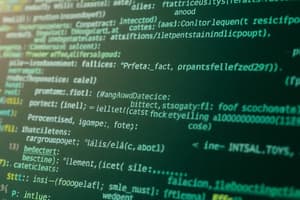Podcast
Questions and Answers
What is a key idea related to networking and communication?
What is a key idea related to networking and communication?
- Setting up a local area network
- Understanding how information is exchanged in networks (correct)
- Use of cloud storage solutions
- Development of mobile applications
What aspect of computing technology do students examine when considering the impact on society?
What aspect of computing technology do students examine when considering the impact on society?
- Technical specifications of computing hardware
- Development of software applications
- Social, ethical, and cultural effects generated by computing technologies (correct)
- Cost analysis of computing devices
What is an important consideration in networking?
What is an important consideration in networking?
- Speed of internet connection
- Cost of networking equipment
- User interface design
- Data security and privacy (correct)
What is a significant feature of Project-Based Learning in AP coursework?
What is a significant feature of Project-Based Learning in AP coursework?
Which of the following is a benefit of project-based learning?
Which of the following is a benefit of project-based learning?
Which core concept helps in breaking complex problems into simpler, manageable parts?
Which core concept helps in breaking complex problems into simpler, manageable parts?
What is an example of a common algorithm used in computer science?
What is an example of a common algorithm used in computer science?
Which programming language is NOT typically associated with introductory programming courses?
Which programming language is NOT typically associated with introductory programming courses?
What technique is used to extract insights from datasets?
What technique is used to extract insights from datasets?
Which of the following does NOT represent a form of data?
Which of the following does NOT represent a form of data?
In the context of algorithms, what does efficiency primarily refer to?
In the context of algorithms, what does efficiency primarily refer to?
Which process is a major component of computational thinking?
Which process is a major component of computational thinking?
What does abstraction help to achieve in complex systems?
What does abstraction help to achieve in complex systems?
Flashcards
Computational Thinking
Computational Thinking
Applying problem-solving strategies that use computer science concepts and tools to solve problems that can be solved by computers.
Algorithm
Algorithm
A step-by-step procedure to solve a problem.
Data
Data
Information in various forms (numbers, text, images, etc.) that can be organized and processed to solve problems.
Data Representation
Data Representation
Signup and view all the flashcards
Programming
Programming
Signup and view all the flashcards
Abstraction
Abstraction
Signup and view all the flashcards
Data Analysis
Data Analysis
Signup and view all the flashcards
Algorithm Efficiency
Algorithm Efficiency
Signup and view all the flashcards
Networking Data Flow
Networking Data Flow
Signup and view all the flashcards
Computing Impact on Society
Computing Impact on Society
Signup and view all the flashcards
Project-Based Learning in AP
Project-Based Learning in AP
Signup and view all the flashcards
Ethical Considerations (computing)
Ethical Considerations (computing)
Signup and view all the flashcards
Data types & processing
Data types & processing
Signup and view all the flashcards
Study Notes
Fundamental Concepts
- Computer science principles involve understanding computational processes, data, algorithms, and programming, as well as societal impact and ethical considerations.
- The course explores computational thinking, which encompasses problem-solving strategies that use computer science concepts and tools.
- Key concepts include abstraction, decomposition, pattern recognition and generalization.
- Students analyze data, evaluate algorithms, and develop programs.
Data
- Data can be represented in various forms, such as numbers, text, images, and audio.
- Data can be organized in structures like lists, tables, and trees.
- Data can be manipulated and processed to answer questions or solve problems.
- Data analysis techniques are used to extract insights from datasets. This includes statistical analysis and visualization techniques.
- Data is often collected, stored, and used for decision making. Data handling has significant implications concerning privacy and security.
Algorithms
- Algorithms are step-by-step procedures to solve problems or accomplish tasks.
- Algorithms involve sequential, conditional, and iterative steps.
- Algorithm efficiency is crucial; speed and memory usage are often important factors.
- Algorithms form the basis of programming and computer solutions.
- Common algorithms include sorting, searching, and graph traversal.
Programming
- Programming involves writing instructions for a computer to execute.
- Programming languages provide structured methods for instructing a computer.
- Programming languages include Python, JavaScript, and others.
- Students learn programming concepts like variables, loops, and functions.
- Programming tools include Integrated Development Environments (IDEs).
Computational Thinking
- Computational thinking involves applying problem-solving approaches suitable to compute solutions.
- It provides a systematic way of thinking about problems that can be solved by computers.
- It helps students analyze problems from different viewpoints and identify the underlying computations.
- Decomposing complex problems into smaller, more manageable subproblems is a core element.
Data Representation and Abstraction
- Data can be represented in various ways, including text, numbers, images, and sound.
- Abstraction is essential for simplifying complex systems, focusing on essential details while ignoring unnecessary complexities.
- Different types of data have different requirements and characteristics that affect processing and storage methods..
Networking and Communication
- Understanding how information is exchanged in networks is a key idea.
- The internet and its role in facilitating communication are part of this.
- Students learn about networking protocols and how data flows through networks.
- Data security and privacy in networking are important considerations.
Impact and Ethics
- Students examine the social, ethical, and cultural effects generated by computing technologies .
- The influence of computing on society and current events is analyzed.
- Students consider ethical considerations related to algorithms, data, and use of computer technology.
- Societal responsibilities and their impact on computer technologies are examined.
Project-Based Learning
- Principle AP coursework usually involves significant project-based learning opportunities.
- Projects often involve applying the concepts covered to real-world issues and problems.
- Projects help students synthesize knowledge and explore specific problem domains in-depth.
- Projects give students opportunities to demonstrate and develop creative problem-solving abilities.
Studying That Suits You
Use AI to generate personalized quizzes and flashcards to suit your learning preferences.
Description
Explore the fundamental concepts of computer science principles including computational processes, data manipulation, and ethical considerations. This quiz covers key topics around computational thinking, data representation, and analysis techniques. Test your knowledge on how data is structured and used in decision making.




